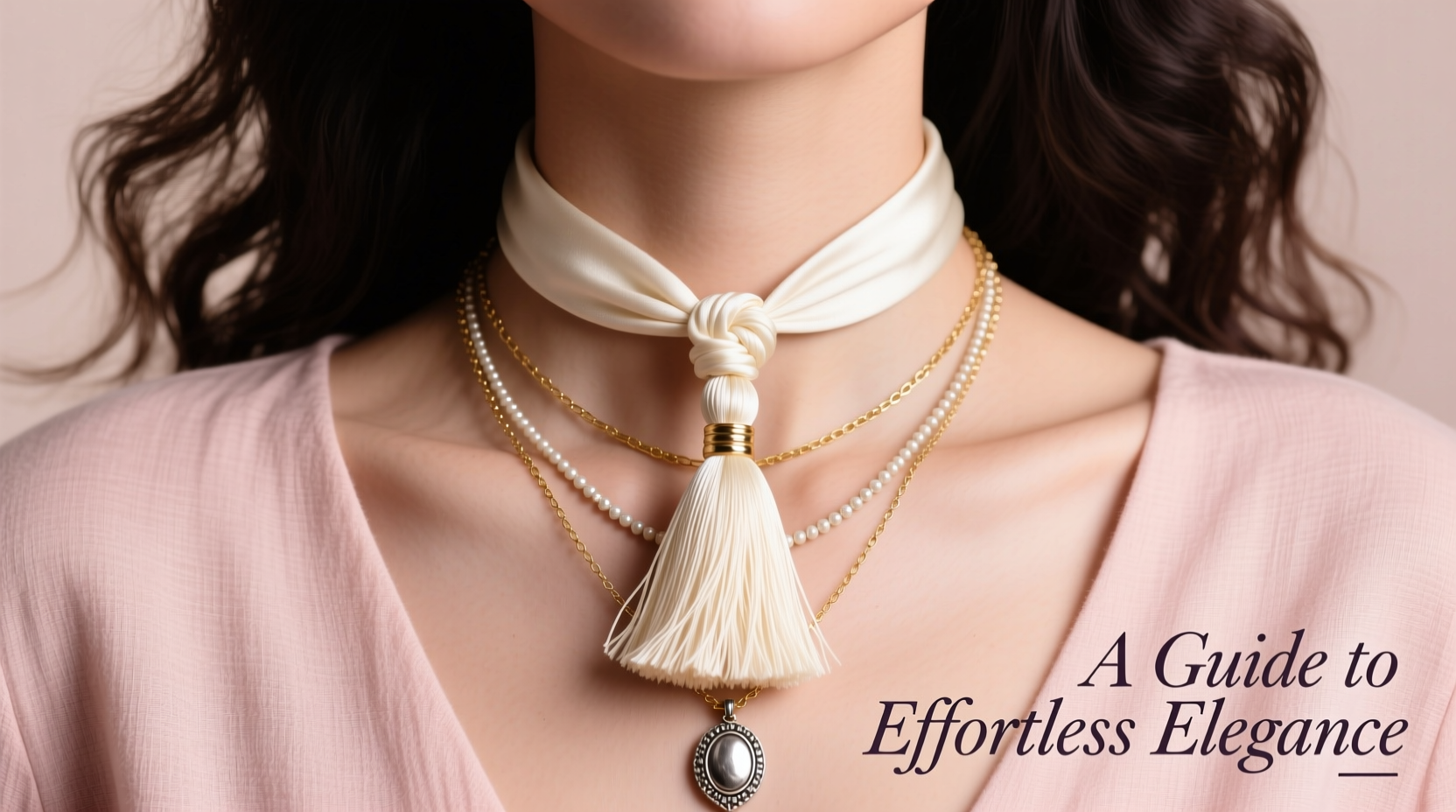In recent years, the tassel choker has emerged as a signature piece in modern jewelry wardrobes—offering a blend of bohemian charm and contemporary sophistication. When paired thoughtfully with layered necklaces, it transforms an ordinary outfit into a curated statement of personal style. The key lies not in stacking pieces haphazardly, but in creating balance, rhythm, and visual harmony. Whether you're dressing up for a night out or elevating your everyday ensemble, mastering this combination can redefine your aesthetic with minimal effort and maximum impact.
The Art of Layering: Beyond the Basics

Layering necklaces is more than just wearing multiple chains at once—it's about crafting a narrative through texture, length, and proportion. A tassel choker, typically sitting snug around the base of the neck, acts as the anchor. Its movement adds dynamism, while its structure provides a focal point. When building layers above it, consider starting with a delicate chain between 16–18 inches, followed by slightly longer pieces reaching 20–24 inches. This staggered approach prevents tangling and ensures each necklace remains visible.
Mix metals sparingly unless your wardrobe leans toward intentional eclecticism. For example, pairing rose gold with silver can work if balanced by neutral tones in clothing or other accessories. The goal is cohesion, not clutter.
Choosing the Right Tassel Choker
Not all tassel chokers are created equal. Materials, length, and tassel density influence how well they integrate into a layered look. Silk-thread tassels offer softness and drape beautifully under pendants, while beaded or metallic tassels add structure and shine. Opt for chokers between 14–16 inches to ensure they sit high on the neck without restricting movement.
Consider the neckline of your outfit when selecting a choker. V-necks and off-the-shoulder tops create ideal frames for showcasing layered pieces, allowing the tassel to peek through without competing for attention. High collars or turtlenecks may limit visibility, so reserve those pairings for simpler looks.
| Choker Type | Best For | Avoid With |
|---|---|---|
| Silk Tassel Choker | Boho, romantic, or minimalist styles | Bulky sweaters or stiff fabrics |
| Chain-Link Tassel Choker | Edgy, urban, or evening wear | Overly ornate blouses |
| Bejeweled Tassel Choker | Cocktail events or formal occasions | Other statement necklaces |
Step-by-Step Guide to Building Your Stack
Creating a harmonious layered look with a tassel choker follows a deliberate sequence. Follow these steps to achieve elegance without overcomplication:
- Start with the choker. Secure your tassel choker first, ensuring it rests comfortably against your skin.
- Add a mid-length pendant. Choose a simple pendant on a 18-inch chain—something geometric or organic in shape—to introduce depth.
- Introduce texture. Add a 20-inch chain with subtle beads, a tiny charm, or a fine cable link to break up visual monotony.
- Finish with a longer layer. A 22–24 inch rope chain or a lariat-style necklace draws the eye downward, elongating the neck.
- Adjust and assess. Step back, check symmetry, and gently separate chains if they clump. A small drop of clear nail polish on clasp ends can prevent slipping.
“Balance isn’t about symmetry—it’s about intention. A tassel brings motion; the layers should frame it, not fight it.” — Lila Monroe, Jewelry Stylist & Creative Director at Atelier Adorn
Real-Life Example: From Day to Night
Sophia, a graphic designer based in Austin, uses her tassel choker as a daily staple. By day, she pairs a muted terracotta silk tassel choker with a single 18-inch matte gold bar necklace over a crisp white button-down. The look is polished yet understated. For evening events, she adds two more layers: a delicate 20-inch chain with a tiny moon charm and a 22-inch paperclip chain. The tassel sways subtly with her movements, catching candlelight during dinner. Her secret? “I only wear one earring—a long drop on the opposite side of my face—to keep the focus on the necklaces.”
This scenario illustrates how thoughtful layering adapts across contexts. The foundation (the choker) stays consistent, while additional elements shift based on occasion and energy.
Do’s and Don’ts of Tassel Choker Layering
To avoid common pitfalls, refer to this concise checklist before styling:
- Do mix textures—matte with shiny, smooth with woven.
- Do consider your hair. Updos highlight tassels; loose waves soften their impact.
- Don’t overload below the collarbone. Too many pendants compete with the tassel’s flow.
- Don’t ignore scale. A thick tassel needs thinner accompanying chains to avoid heaviness.
- Do fasten clasps securely. Use a magnifying mirror if needed to ensure safety.
Frequently Asked Questions
Can I wear a tassel choker with a high neckline?
Yes, but opt for a shorter tassel or one with a minimalist design. Avoid excessive volume. Alternatively, let the tassel drape down the back for a surprise detail.
How do I keep layered necklaces from tangling?
Use anti-tangle solutions like necklace extenders or clips between layers. Store them individually when not in use. Wearing them in order—from longest to shortest—also reduces friction during the day.
Is it okay to mix vintage and modern pieces in a layered stack?
Absolutely. Vintage lockets or heirloom chains add character when juxtaposed with a sleek tassel choker. Just ensure the color tone (gold, silver, rose gold) aligns across pieces for cohesion.
Final Thoughts: Cultivating Effortless Elegance
Effortless elegance isn’t achieved through excess—it’s born from restraint, awareness, and a touch of daring. A tassel choker invites movement and personality into your jewelry rotation, and when layered with care, it becomes the centerpiece of a story told in metal, thread, and light. The most memorable styles aren’t those dictated by trends, but the ones that feel authentic—where every piece has purpose, and every glance catches something worth noticing.
Begin with one choker and one companion chain. Experiment with lengths, materials, and silhouettes until the combination feels like an extension of your mood. Over time, you’ll develop an intuitive sense of what works—not because you’ve memorized rules, but because you’ve learned to trust your eye.









 浙公网安备
33010002000092号
浙公网安备
33010002000092号 浙B2-20120091-4
浙B2-20120091-4
Comments
No comments yet. Why don't you start the discussion?